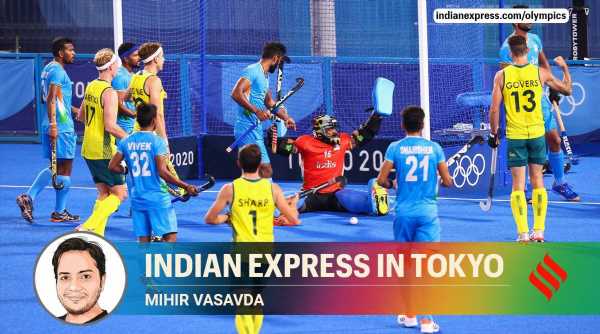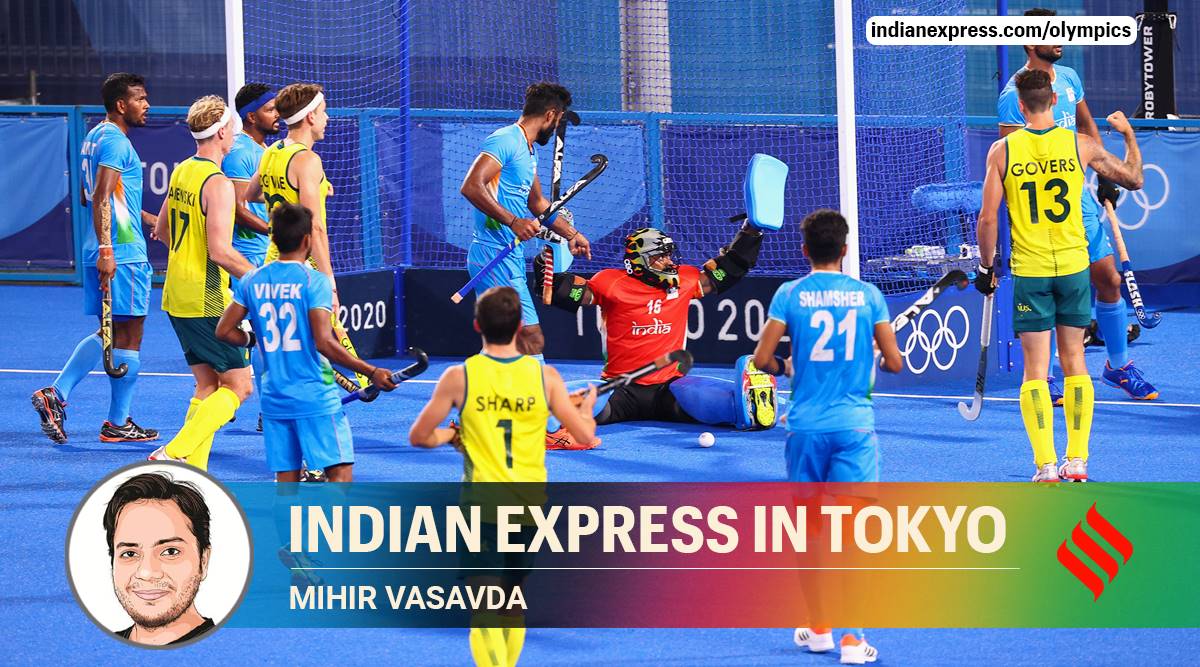With a little bit of meanness and a whole lot of aggression, Australia condemned India to its heaviest defeat at the Olympics in the 128 matches played on the biggest stage – the previous one being the 6-1 loss, also to Australia, at the 1976 Montreal Olympics.
Where to even begin?
At the point when PR Sreejesh desolately sat in goal after conceding the seventh? Or when Dilpreet Singh punched the air in delight after scoring a goal only to turn around and see that most of his teammates stood with long faces in their own half, with resigned looks? Or maybe when, right at the end, the DJ, as if trying to make a point, played Freddie Mercury’s lines, ‘I get so lonely, lonely…’ when the players stood impassively in a huddle after the 7-1 thrashing against Australia?
Best to begin, perhaps, by mentioning just how good Australia were. This wasn’t only about them being ruthless; that they always have been. The Kookaburras, as they are called, had fooled the hockey world into believing that they weren’t as strong a team as they once were heading into the Tokyo Olympics.
Their sixth-place finish in Rio five years ago was given as one reason. The rise of Belgium and the Netherlands raising their game – and Australia’s seeming inability to match them consistently – in the last few years was seen as another warning sign. The patchy performance against hosts Japan in the opening match of these Games was further ‘proof’ that Australia had lost their aura.
With a little bit of meanness and a whole lot of aggression, Australia condemned India to its heaviest defeat at the Olympics in the 128 matches played on the biggest stage – the previous one being the 6-1 loss, also to Australia, at the 1976 Montreal Olympics.
The Colin Batch-coached side played with a level of efficiency that would have made the Japanese proud and showed they have no sense of occasion. The last time Australia scored seven or more past India at a major competition – the 2010 Commonwealth Games final – there was no space to move inside the stadium and the entire country was hooked.
Bad day gets worse
On Sunday, hopes were once again pinned on the hockey team to salvage what had been a largely miserable day for India at Tokyo 2020, save for a few impressive wins by PV Sindhu, Mary Kom and Manika Batra.
The afterglow of the silver medal that Mirabai Chanu won on Saturday was already beginning to wear off on the Indian contingent. At the shooting range in Asaka, which was an American army camp from 1945 to 1960, the bubble that the shooting team was living in was burst after none of the rifle and pistol shooters could make the final of their events.
Manu Bhaker had to deal with a pistol malfunction and Divyansh Panwar took long breaks between shots to consult coach Oleg Mikhailov – once, they spoke for a good 10 minutes in the middle of qualification – as India’s young brigade got a taste of the beast that the Olympics are.
An hour’s drive away at Ariake, Sania Mirza and Ankita Raina surrendered their advantage to bow out in the women’s doubles first round while Manish Kaushik lost his opening bout, making it two defeats out of two for India’s male boxers at these Olympics.
On a hot, extremely sultry day when even laptops needed coolers, looking for an Indian win was tougher than searching for a drop of water in a dry, arid land. It was expected that the men’s hockey team would at least put up a fight against the Australians, if not beat them. But placing hopes on the hockey team is like a hopeless gambler placing one final bet, convinced he’ll break even.
Aussies find their groove
Both Australia and India had made rusty starts to the tournament on Saturday but the men from Down Under found their rhythm very quickly on Sunday. And the result of the match was never in doubt from the moment Daniel Beale opened the scoring in the 10th minute, converting from a nice-worked indirect penalty corner routine.
India attempted to fight for some duration of the remaining first quarter but did not even pretend in the second, as Australia raced to a 4-0 lead as the Indians practically stopped playing.
Three or four Australian players were closing down every Indian in midfield to win back possession each time they had the ball. This pressure meant the Indians were forced to pass the ball to their teammates in panic, without actually thinking through a move.
India’s man-to-man marking did not serve the purpose as Sreejesh was exposed at the back far too often while the midfield was continuously getting overrun, forwards were isolated at the far end and barely got to touch the ball, as Australia controlled the game’s tempo. India seemed too shocked, too overwhelmed by Australia’s ruthless aggression, and simply froze.
What next?
Coach Graham Reid was left uttering words similar to what all previous Indian coaches have fallen back on when they have lost a big match. “The positive is,” Reid, who was Australia’s coach at the Rio Olympics, says “We created a lot of chances. We need to start converting them.”
Reid wasn’t wrong. India entered Australia’s ‘D’ two times more (24 compared to 22) but stats like these hardly have any significance unless they are converted into goals. And that’s where India’s problems, with an inexperienced and much-scrutinised forward line, will remain going forward.
For the moment, Reid’s biggest concern would be how his team will respond to this thrashing. They play Spain next on Tuesday, and to stay on course for a top-four finish in the group – which will ensure a place in the quarterfinals – it’s critical for India to bounce back immediately.
Source: Read Full Article



